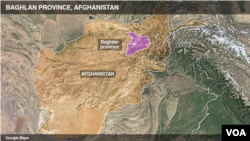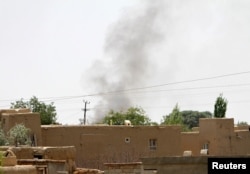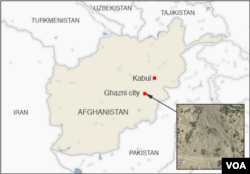A pre-dawn Taliban raid on a military base in northern Afghanistan has killed at least 40 security forces, the latest in a series of insurgent attacks across the country inflicting heavy casualties on government forces.
A security official in the province of Baghlan, where the attack occurred, told VOA on condition of anonymity that 31 Afghan National Army (ANA) soldiers and nine policemen were among the dead.
A Taliban spokesman claimed the offensive captured two bases in the area and killed up 70 Afghan forces, though insurgent battlefield claims are often inflated.
The attack came a day after the Taliban seized a key ANA base in the neighboring Faryab province, killing and capturing dozens of soldiers.
Officials told VOA on Tuesday that 40 of the 70 soldiers stationed at the base surrendered to the Taliban. The rest, they said, had either been killed or fled to nearby mountains during the two days of intense clashes.
Situation eased in Ghazni
Meanwhile, the United Nations warned Wednesday that days of fighting in the embattled southeastern city of Ghazni has inflicted “terrible suffering” on the civilians.
The Taliban assaulted the strategically important city Friday morning, sparking deadly clashes with Afghan forces for the next five days. Much of the city buildings were set ablaze during the fighting, according to families who fled immediately after the insurgents attacked.
Provincial authorities announced Tuesday afternoon that insurgents had been evicted from much of Ghazni and clearing operations were underway on the city’s outskirts.
For its part, the Taliban said its fighters have pulled back from the city after inflicting heavy casualties on government forces. The insurgents control or influence a majority of the districts in the province, also named Ghazni.
The Afghan army chief has confirmed the government lost 100 soldiers and police personnel while battling the Taliban and nearly 200 insurgents were also killed. The provincial governor told VOA the clashes in Ghazni also left 30 civilians dead. U.N. officials said unconfirmed estimates ranged from 110 to 150 civilians
“Reliable information indicates that the Ghazni Public Hospital is overwhelmed by a continuous influx of injured government forces, Taliban fighters and civilians,” said Tadamichi Yamamoto, who heads U.N. Assistance Mission in Afghanistan (UNAMA)
The hospital was overcrowded with hundreds of wounded people and dozens of bodies, residents and doctors said.
Relief supplies needed
The International Committee of the Red Cross (ICRC) said it was doing all it could to help the people of Ghazni and the aid agency has also provided emergency supplies to the hospital.
The situation in Ghazni, particularly for non-combatants remained grim, as the fighting has led to electricity outages along with water and food shortages, Yamamoto noted.
The fighting has disrupted communication networks in the city of 270,000 people and roads remain blocked, preventing freedom of movement for families seeking safety, he said.
“The fighting in Ghazni must stop and the fighting in Afghanistan must stop. Confidence-building steps that immediately reduce violence are crucial, and talks between the Afghan government and the Taliban are necessary to identify and expand common ground,” said Yamamoto.
Afghan security officials have said foreign fighters, including Arabs, Chechens and Pakistanis, were also among Taliban fatalities in Ghazni, though they have not offered any proof.
A Washington-based Afghan diplomat twitted a video showing Pakistani villagers allegedly organizing funeral for a suspected militant who died while fighting alongside the Taliban in Ghazni. It was difficult to ascertain when and exactly where the video was filmed.
Authorities in Pakistan maintain that some insurgent "facilitators and abetters" might be hiding among the nearly three million Afghan refugees still living in the country.
Pakistani militants had filled Taliban ranks in Afghanistan when the Islamist group was ruling most of the war-shattered country until it was ousted from power by a U.S.-led military coalition in 2001 for sheltering al-Qaida leaders.
Pakistan maintains it has boosted security on the porous Afghan border and is unilaterally building a robust fence to deter militant infiltration in either direction. Officials also reject the Afghan Taliban is using Pakistani soil for insurgent activities in Afghanistan.



